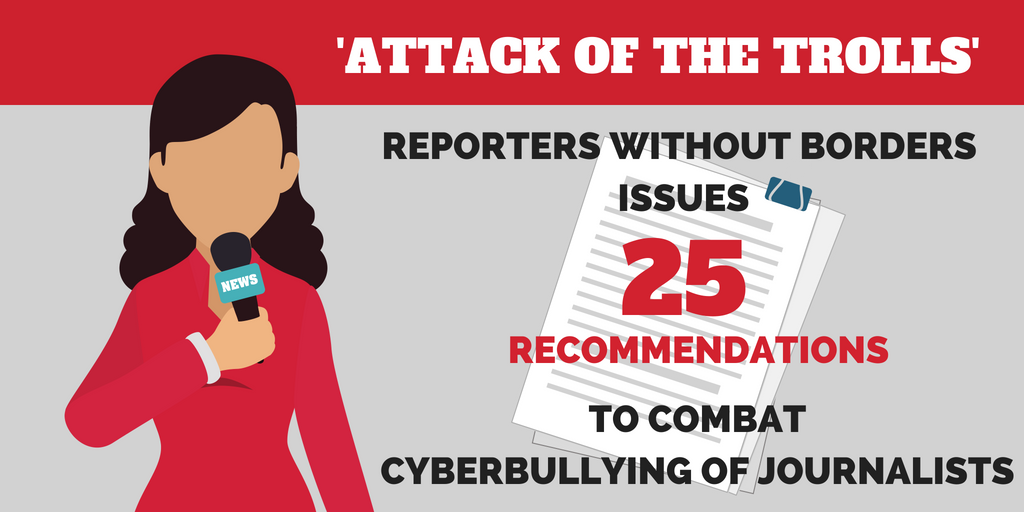
Over the last couple of years, online disinformation has risen on the international scene as an ever-growing problem. At the forefront of the battle for the value of facts are journalists, upholding one of the most important pillars of a free and democratic society: free and independent media.
Reporters Without Borders (RSF) and their partners launched an initiative earlier this year aiming at combatting disinformation: #JournalismTrustInitiative. RSF also recently published a new report called “Online Harassment of Journalists – Attack of the Trolls”, on the topic of online attacks against journalists, in which they present 25 recommendations directed at governments, international institutions, online platforms, media organizations and advertisers.
In the report, the modus operandi of the press freedom predators who orchestrate their online attacks against journalists are defined in three stages by RSF:
- Disinformation: journalistic content on social networks is drowned in a flood of fake news and pro-government content;
- Amplification: the impact of pro-government content is artificially enhanced by commentators who are paid by the government to post messages on social networks or by bots, computer programs that automatically generate posts;
- Intimidation: journalists are personally targeted, insulted and threatened, in order to discredit them and reduce them to silence.
The report also includes a tutorial for journalists on how to deal with troll armies, and gives an overview of the authoritarian regimes that make use of them. RSF also concludes that female journalists are more likely than male journalists to be targeted with harassment, and the harassment targeting women is often degrading and contains threats of a sexual nature. The 25 recommendations are formulated with the aim of addressing these new digital threats.
To governments:
- Strengthen laws authorizing prosecution for online harassment of journalists
- Strengthen the responsibility of online platforms in regard to content shared on their networks
- Implement systems for alert and rapid intervention in harassment cases
- Guarantee that the rules for fighting hateful content are applied fairly and consistently
- Implement recovery procedures for cyber harassment victims (e.g financial restitution, medical and psychological aid, relocation assistance)
- Prohibit resorting to online influence and destabilization agents – trolls – in order to manipulate public opinion and harass journalists
- At the United Nations, governments must urge creation of a Special Representative for the Safety of Journalists
- European governments must sign and ratify the Additional Protocol to the Council of Europe’s Convention on Cybercriminality
- Governments must encourage multidisciplinary international research on censorship techniques
- Governments must strengthen digital education
- All public policies concerning online violence must take into account its gender-specific nature
To international organizations:
- Continue to urge governments to uphold the principle that “the same rights that people have offline must also be protected online, in particular freedom of expression”
- Contribute to research on methods of online harassment
- International and regional human rights protective systems must include online harassment in their monitoring of abuses against journalists
To online platforms:
- Online platforms must be transparent concerning their rules for moderating online content
- They must ensure that these rules are not turned into methods to silence journalists
- Establish a victim-centred emergency alert system for journalists who are targeted by online threats and attacks
- Cooperate actively with law enforcement authorities in investigations of cyber violence against journalists, with measures including public release of the perpetrators’ names
- Combat online harassment campaigns that are orchestrated by troll factories or bots
- Develop communication and awareness campaigns concerning online violence
To media organizations:
- Acknowledge the threat and learn to anticipate attacks
- Encourage the creation of networks to exchange best practices by developing a holistic approach
- Make online harassment of journalists a major issue
To advertisers:
- Refuse to advertise on sites that participate in dissemination of hate content
- Develop ethics codes and best practices for online advertising
Read the full report here.




